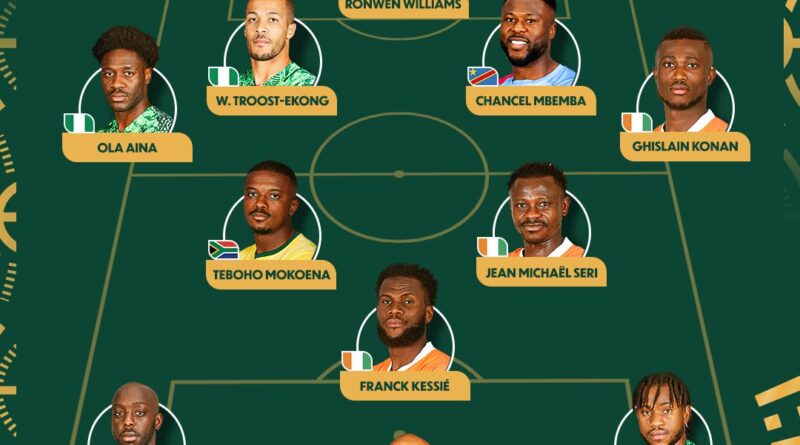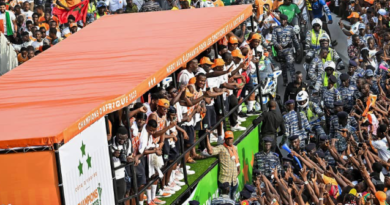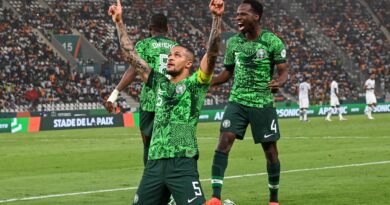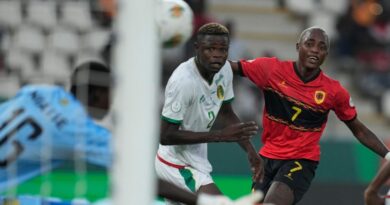CAF unveils team of the tournament with stunning surprises
The 2024 Africa Cup of Nations (AFCON 2024) ended with hosts Ivory Coast winning the competition for the third time last Sunday, at the expense of West African rivals Nigeria at the Alassane Ouattara Stadium.
Some players established themselves on the global stage, like Super Eagles goalkeeper Stanley Nwabali, while others didn’t quite reach the performance levels their reputation hinted at, which includes Nigeria striker Victor Osimhen.
While we wait for CAF’s technical experts to present the official Team of the Tournament, this is what we came up with:
Goalkeeper: Williams
After conceding twice in South Africa’s opening game against Mali, Ronwen Williams didn’t let in a goal again from open play for the remainder of the tournament, keeping five clean sheets.
The only other goal he conceded was from the penalty spot, where William Troost-Ekong’s penalty had given Nigeria the lead in the semi-final.
It did help that Williams played in a defensive setup that was almost entirely composed of his Mamelodi Sundowns teammates, but arguably the finest bits of his campaign came when he was all on his own, in direct confrontation with opponents during the shootouts that defined South Africa’s knock-out games from the quarter-finals onwards.
In two of those episodes, it was captain Williams to the rescue, coming up with six saves in all — including an unprecedented quartet versus Cape Verde — to secure bronze for his country.
Nwabali deserves a mention too, he was truly excellent throughout, but in the end was just shaded by his rival in South Africa’s Premier Soccer League.
Defenders: Mudau, Masuaku, Troost-Ekong, Costa
Another member of Bafana Bafana’s prominent Sundowns contingent, Khuliso Mudau excelled, catching the eye with his work down the right. Defensively, he put in a great shift, while also bombing forward at will to support the attack, stepping it up in the knock-out rounds.
Mudau hardly put a foot wrong during that phase, but for a glaring chance to win the game against Nigeria from close range he bafflingly blazed over. Even that, however, wasn’t enough to blot his copybook significantly.
Former West Ham man Arthur Masuaku, on the other flank, brought his years of experience to bear, proving himself a valid, sterling reference point for his teammates.
The DR Congo left-back kept his standards high, and even when he missed a penalty in the shootout that eventually saw the Leopards eliminate Egypt, Masuaku didn’t stop impressing: see his absolutely majestic freekick against Guinea in the very next game, the highlight of his tournament.
His team may have lost the final, but few would have found it contentious that Nigeria’s William Troost-Ekong got named Player of the Tournament.
The Super Eagles’ stand-in skipper was immense throughout the AFCON, making his presence felt at both ends of the pitch.
The PAOK man was the chief cornerstone of a defence that stayed almost impenetrable before the final, but also scored three times to bring his total at the AFCON to five — the most of any defender in the competition’s history.
Cape Verde had themselves a wonderful tournament, one that saw them top a group that also included Egypt and Ghana, going all the way to the quarter-finals for only the second time.
Much of that was down to how strong the islanders were at the back, where Logan Costa shone on his AFCON debut.
The Toulouse player, who was born in France and has represented that country’s youth national teams in the past, played with composure that belied his tender age of 22 years.
Lining up mainly alongside the vastly more experienced Roberto Lopes, Costa so often looked the more polished half of that solid centre-back pairing and seems set for a very bright future, if he can kick on from here.
Central midfield: Mokoena, Kessie
Teboho Mokoena was a linchpin for South Africa in midfield, contributing to much of the Bafana Bafana attacking play. Mokoena, also of Sundowns, turned up in the sort of form that makes him such a sine qua non for his club, as adept at regulating the midfield as at driving South Africa forward with his ability on the ball.
He chipped in with two goals — a majestic freekick to help sink favourites Morocco in the Round of 16, a late penalty to send the semi-final tie with rivals Nigeria beyond regulation time — and an assist.
And while Mokoena missed his efforts in successive shoot-outs with Nigeria and the DR Congo, his light hardly dimmed.
Some might argue Franck Kessie was emblematic of the sort of slackness that nearly saw the Ivory Coast eliminated from the AFCON at the end of the first round.
If so, the former AC Milan and FC Barcelona midfielder being dropped for the first knock-out game against Senegal seemed to validate such an assessment.
But Kessie, a combative midfielder who holds nothing back, came off the bench to impactful effect in that game, netting the score-tying goal from the spot late in regulation time and then converting in the shootout to win it for his country.
Restored to the starting XI for the remainder of the tournament, Kessie kept his foot on the accelerator, coming up clutch again in the final with the all-important equaliser — his country’s first goal in an AFCON final on the fifth attempt.
Wingers and strikers: Lookman, Dala, Nsue, Haller
It may be Osimhen who was touted as Nigeria’s biggest attacking threat at AFCON before the tournament started, and, indeed, the Napoli man and reigning African Footballer of the Year — despite only scoring once throughout the competition — did much of the heavy lifting upfront with his hassling and harrying.
Still, it was another Italy-based attacker, Atalanta’s Ademola Lookman, who proved the more reliable source of goals, scoring three of the four Nigeria put past opponents in the knock-out rounds.
It was Lookman who proved decisive in the quarter-final clash with Angola, a game in which attacker Gelson Dala failed to make his rather buzzing presence felt for the opposition.
In pretty much all of Angola’s other fixtures, though, Dala was highly conspicuous for his immense offensive output — especially in the victories against Mauritania and Namibia, each of which he contributed two goals to — and, needless to say, left his mark as part of a really fluid Angolan attack that scored the joint-most goals at the tournament (9).
The only player to outscore Dala at the AFCON was Emilio Nsue of Equatorial Guinea. The 34-year-old has often played as a right-back at club level but transforms into a truly prolific finisher for his national team (averaging roughly a goal every other game), netting five times at these finals and bagging — against Guinea-Bissau — the AFCON’s first hat-trick in 16 years.
His two other strikes famously came in the 4-0 demolition of the Ivory Coast that, for a while, threatened to terminate the campaign of the eventual winners prematurely.
Many expected the scoring stakes to be dominated by high-profile names like Osimhen, Mohamed Salah, etc, yet it was lowly Nsue — currently plying his trade in the Spanish third tier — who topped all.
The Ivory Coast ultimately survived the Equatoguinean scare, recovering to stage a rally so fierce in the latter half of the competition that they ended up barging their way to glory.
And no player better embodied that comeback spirit than Sebastien Haller, who wasn’t fit enough to feature in the group stage but joined the cause later on to play a starring role in the triumphant campaign, scoring the goal that took the Elephants to the final as well as the strike that ultimately won the title.
It’s only a vignette of what Haller has had to go through since a cancer diagnosis in summer 2022, only returning to football a year ago — a testament to his mental fortitude.




